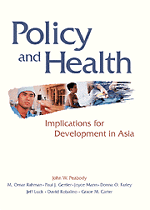Book contents
- Frontmatter
- Foreword
- Preface
- Contents
- Tables
- Figures
- Boxes
- Chapter One OVERVIEW: THE ROLE AND RESPONSIBILITY OF GOVERNMENTS IN THE HEALTH SECTOR
- Chapter Two EVIDENCE-BASED POLICY: USING DATA TO INFORM POLICY AND IMPROVE HEALTH OUTCOMES
- Chapter Three PRIORITIZING MEDICAL INTERVENTIONS: DEFINING BURDEN OF DISEASE AND COST-EFFECTIVE INTERVENTIONS IN THE PURSUIT OF UNIVERSAL PRIMARY CARE
- Chapter Four FINANCING AND ALLOCATING PUBLIC EXPENDITURES: LEVERAGING PUBLIC RESOURCES TO MEET OBJECTIVES AND INCREASE PRIVATE PARTICIPATION
- Chapter Five TOWARD BETTER EQUITY AND ACCESS: PERSISTENT POVERTY, INADEQUATE INTERVENTIONS, AND THE NEED FOR BETTER DATA AND SOLUTIONS
- Chapter Six GOVERNMENT AND THE IMPROVEMENT OF HEALTH BEHAVIORS
- Chapter Seven IMPLEMENTING POLICY OBJECTIVES: THE ROLE AND RESPONSIBILITIES OF THE MINISTRY OF HEALTH
- Acronyms
- Data Notes and Glossary—Chapter Two
- References
- Authors
- Index
- Plate section
Chapter One - OVERVIEW: THE ROLE AND RESPONSIBILITY OF GOVERNMENTS IN THE HEALTH SECTOR
Published online by Cambridge University Press: 18 December 2009
- Frontmatter
- Foreword
- Preface
- Contents
- Tables
- Figures
- Boxes
- Chapter One OVERVIEW: THE ROLE AND RESPONSIBILITY OF GOVERNMENTS IN THE HEALTH SECTOR
- Chapter Two EVIDENCE-BASED POLICY: USING DATA TO INFORM POLICY AND IMPROVE HEALTH OUTCOMES
- Chapter Three PRIORITIZING MEDICAL INTERVENTIONS: DEFINING BURDEN OF DISEASE AND COST-EFFECTIVE INTERVENTIONS IN THE PURSUIT OF UNIVERSAL PRIMARY CARE
- Chapter Four FINANCING AND ALLOCATING PUBLIC EXPENDITURES: LEVERAGING PUBLIC RESOURCES TO MEET OBJECTIVES AND INCREASE PRIVATE PARTICIPATION
- Chapter Five TOWARD BETTER EQUITY AND ACCESS: PERSISTENT POVERTY, INADEQUATE INTERVENTIONS, AND THE NEED FOR BETTER DATA AND SOLUTIONS
- Chapter Six GOVERNMENT AND THE IMPROVEMENT OF HEALTH BEHAVIORS
- Chapter Seven IMPLEMENTING POLICY OBJECTIVES: THE ROLE AND RESPONSIBILITIES OF THE MINISTRY OF HEALTH
- Acronyms
- Data Notes and Glossary—Chapter Two
- References
- Authors
- Index
- Plate section
Summary
As recently as 1960, a child born into poverty anywhere in the world had only a one-in-four chance of reaching his fifth birthday, while a person age 15 had a life expectancy of 67 years. Today, vaccines protect eight out of ten of the world's children, more than nine out of ten infants will enroll in school, and the average adult will live into his eighth decade. Around the world, the health gains made in the past two generations are arguably the greatest accomplishment of civilization. What makes these gains so remarkable is that they have been accomplished by people living on every continent on the globe—people representing a panoply of cultures, social structures, and values. Amid this diversity, there is a consistent belief that all societies, and the governments that represent them, are responsible for improving the well-being of the population.
In the health sector, this responsibility means understanding the many factors that go into improving people's health. Some of the most important factors—such as national economic development, education, particularly of women, and the creation of technologies that lead to more effective clinical care—lie outside of what is typically viewed as the health sector. Although these factors are not directly involved with the financing, organization, and delivery of health care, they are substantive sectoral inputs into any country's effort to create better health for its population, and, thus, need to be understood in any health policy context.
- Type
- Chapter
- Information
- Policy and HealthImplications for Development in Asia, pp. 1 - 29Publisher: Cambridge University PressPrint publication year: 1999

